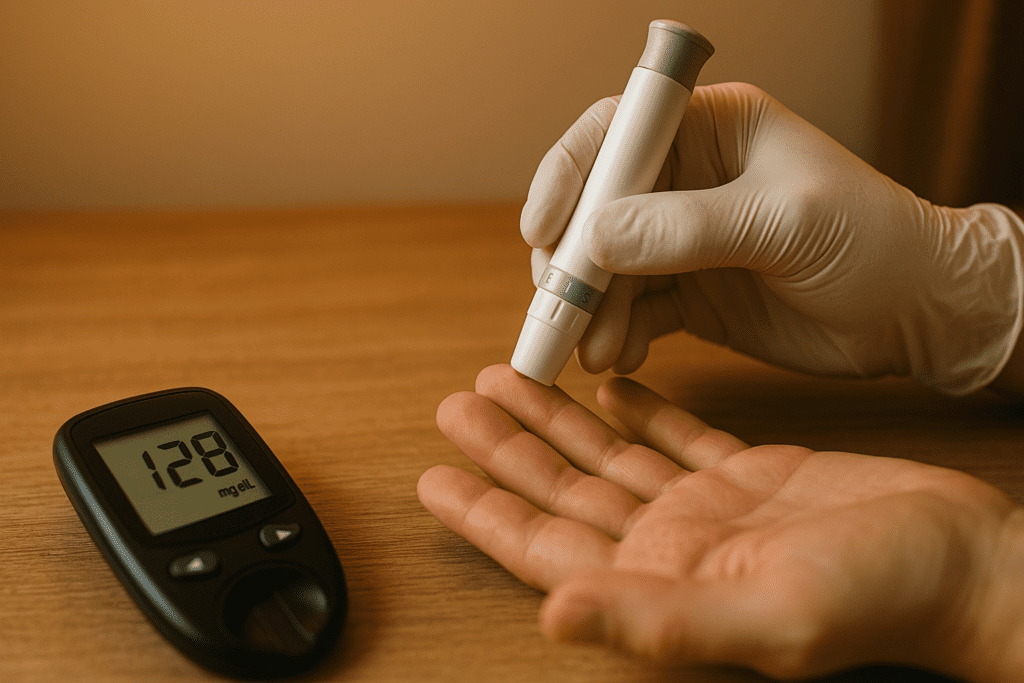Headaches are one of the most common health complaints around the world, affecting millions of people across all age groups. While they can arise from a range of triggers—stress, dehydration, poor posture, sleep disturbances—emerging research points to a less commonly considered yet clinically significant cause: fluctuations in blood sugar levels. Specifically, the relationship between high blood sugar and headaches is becoming increasingly evident as scientists unravel how glucose regulation impacts the brain, nervous system, and vascular function. Understanding this connection not only broadens our comprehension of headache pathophysiology but also reveals important implications for metabolic health and chronic disease management.
You may also like: How Diabetes Affects the Brain: Understanding Brain Fog, Memory Loss, and Mental Confusion from High Blood Sugar
In this deep-dive exploration, we’ll uncover how and why high blood sugar levels and headaches are connected, what happens physiologically when glucose levels rise or fall, and how this dynamic can lead to both acute and persistent head pain. We’ll also explore scientific insights into the vascular, hormonal, and neurochemical mechanisms at play, and provide practical guidance on managing headaches related to blood sugar imbalance—even in individuals without diabetes. Whether you’re navigating hyperglycemia, experiencing unexplained headaches, or seeking to support cognitive and metabolic wellness, this article offers an evidence-based, expert-level overview that connects the dots between glucose, pressure, and pain.

How Blood Sugar Affects the Brain: The Energetic Roots of Head Pain
The brain is a metabolically demanding organ, accounting for approximately 20% of the body’s energy use despite making up only about 2% of its weight. Glucose is its primary fuel, and even brief imbalances—too high or too low—can impair neuronal activity, alter neurotransmitter balance, and trigger vascular responses that result in pain. When glucose levels rise above the normal range, a state known as hyperglycemia, cellular energy metabolism can become dysregulated. This not only places oxidative stress on neurons but also affects cerebrovascular tone, leading to symptoms such as fatigue, fogginess, and notably, headaches.
Hyperglycemia can cause an osmotic shift, where excess glucose in the bloodstream draws water out of cells. This cellular dehydration may lead to increased intracranial pressure or irritation of pain-sensitive structures within the brain. For many individuals, this manifests as a dull, persistent high blood sugar headache, particularly when glucose remains elevated over time. Additionally, the blood-brain barrier—a highly selective membrane that protects the brain—can become compromised in chronic hyperglycemia, further exacerbating neurological symptoms, including pain.
The answer to the question “can high blood sugar cause headaches?” lies partly in the brain’s reliance on tightly regulated glucose levels. Any disruption to this balance—whether acute or chronic—can induce physiological stress that the brain perceives as pain. Importantly, this effect is not limited to individuals with diabetes. Even people without a formal diagnosis may experience postprandial (after-meal) blood sugar spikes that are sufficient to trigger discomfort.
Vascular Tension and Glucose: A Hidden Driver of Headache Sensitivity
Vascular theory has long been a foundational explanation for certain types of headaches, particularly migraines. According to this perspective, fluctuations in the tone and diameter of blood vessels can lead to altered blood flow and subsequent pain. In the context of elevated blood sugar, this theory gains particular relevance. Hyperglycemia has been shown to increase the stiffness of arterial walls and reduce endothelial function—the ability of blood vessels to dilate and contract properly. These changes can lead to increased blood pressure within the cranial vessels, contributing to the sensation of pressure or throbbing in the head.
The question “does high blood sugar levels cause headaches?” is often answered in the affirmative when one considers the effect of glucose on vascular function. Excess glucose can stimulate the production of advanced glycation end products (AGEs), which damage blood vessels over time and reduce their elasticity. This vascular rigidity makes the brain more susceptible to pressure-induced pain during episodes of elevated blood sugar. Furthermore, insulin resistance—a condition often preceding or accompanying hyperglycemia—impairs nitric oxide production, further limiting the body’s ability to regulate cerebral blood flow.
In some cases, individuals may experience what’s described as “diabetes pressure in head,” a subjective sense of tightness or heaviness that coincides with elevated glucose. Though not always clinically classified as a headache, this sensation may represent a milder or early-stage neurological response to blood sugar dysregulation. It reflects the subtle yet significant role that vascular tension plays in mediating the discomfort linked to high glucose states.
The Role of Inflammation and Oxidative Stress in Glucose-Related Headaches
Beyond vascular tension and energetic imbalance, inflammation is another key factor that links high glucose with headaches. Chronically elevated blood sugar triggers the activation of inflammatory pathways throughout the body, including in the central nervous system. Inflammatory cytokines such as IL-6 and TNF-alpha have been found to increase in hyperglycemic states, and their presence can sensitize pain pathways, particularly those involving the trigeminal nerve, which is closely linked to migraine and tension-type headaches.
Oxidative stress—caused by an imbalance between free radicals and antioxidants—is also elevated in individuals with high blood sugar. This oxidative environment damages cellular components and promotes neuroinflammation. Within the brain, oxidative stress compromises mitochondrial function, leading to reduced energy production and increased vulnerability to pain. The link between oxidative stress and headache is well-established, particularly in the migraine literature, but newer research is now confirming that these same mechanisms are at play in people experiencing high blood sugar headaches.
So, can hyperglycemia cause headaches? The inflammatory and oxidative pathways offer a compelling biological “yes.” They also suggest that managing blood sugar is not only a metabolic concern but a neurological one. Reducing postprandial spikes, enhancing antioxidant intake, and minimizing systemic inflammation may therefore offer meaningful relief to individuals struggling with blood sugar-related head pain.
Hypoglycemia and Rebound Headaches: When Low Blood Sugar Adds to the Problem
While much of the focus in discussions about glucose and headaches centers around hyperglycemia, it is essential to acknowledge the opposite condition: hypoglycemia. Low blood sugar can be equally disruptive to brain function and is often implicated in sudden-onset, intense headaches. In fact, many individuals wonder, “will low blood sugar cause headaches?”—and the clinical answer is yes. Headaches and low blood sugar levels often go hand-in-hand, especially in people with insulin dysregulation or those who experience reactive hypoglycemia after meals.
During hypoglycemia, the brain is deprived of its primary fuel, leading to neuroglycopenic symptoms such as confusion, blurred vision, fatigue, and head pain. Compounding this is the fact that the body responds to low glucose with a surge of counterregulatory hormones—epinephrine, cortisol, and glucagon—that raise blood sugar levels but also increase blood pressure, stress the cardiovascular system, and heighten pain sensitivity. This hormonal cascade can make a hypoglycemia-related headache feel more intense and harder to treat.
Interestingly, some individuals experience rebound hyperglycemia following a hypoglycemic episode. This creates a “rollercoaster” effect where glucose levels swing dramatically, stressing both the vascular and nervous systems. These fluctuations are particularly problematic for the brain, which prefers steady, reliable access to glucose. Thus, whether it’s a rapid drop or a reactive surge, instability in blood sugar can provoke neurological symptoms, underscoring the importance of stable glycemic control for headache prevention.
Blood Sugar and Migraine Susceptibility: A Closer Look at the Connection
Migraine is a complex, often disabling neurological disorder that affects nearly 12% of the population. Although the precise mechanisms of migraine remain incompletely understood, mounting evidence indicates that glucose metabolism plays a critical role in migraine initiation and progression. For some individuals, high sugar intake—or even rapid swings in glucose—can be a potent migraine trigger. This lends credibility to the question, “can high glucose cause headaches?” especially in those with a migraine history.
Studies show that migraineurs often exhibit abnormal insulin sensitivity and glucose regulation compared to the general population. Some researchers believe that mitochondria in the brains of people with migraines may be less efficient at using glucose, which makes them more vulnerable to energy shortfalls during times of glycemic variability. In this context, even a modest increase in blood sugar may lead to a headache, not because of absolute hyperglycemia, but because of impaired glucose utilization in the brain.
Moreover, the inflammatory and neurovascular aspects of migraine are influenced by blood sugar dynamics. When individuals with migraine consume high-glycemic foods, the resultant insulin spike can trigger downstream pathways involving nitric oxide, histamine, and prostaglandins—all of which contribute to vascular dilation and pain. These insights help explain why some people experience migraines as a result of dietary choices, particularly those that sharply elevate blood glucose.
Non-Diabetic Hyperglycemia: An Under-Recognized Headache Trigger
One of the most underappreciated aspects of glucose-related headaches is their prevalence in individuals without a formal diabetes diagnosis. Non-diabetic hyperglycemia, characterized by transient but clinically significant elevations in blood sugar, often goes undetected. However, the physiological impact—especially on the brain—can be profound. Individuals experiencing non-diabetic hyperglycemia often report unexplained fatigue, mental fog, and headaches, which are frequently misattributed to stress or dehydration.
The connection here lies in the brain’s sensitivity to glucose fluctuations. While a single spike may not cause long-term harm, repeated episodes of elevated blood sugar—even in the absence of diabetes—can impair vascular function and increase the risk of insulin resistance. As a result, the answer to the question “does high sugar level cause headaches?” extends beyond diagnosed diabetics. Anyone experiencing frequent post-meal crashes, unexplained fatigue, or recurring head pain should consider monitoring their glucose response to common foods.
Advances in continuous glucose monitoring (CGM) now allow individuals without diabetes to gain insights into their personal glycemic patterns. This can reveal “silent” spikes that may otherwise go unnoticed but contribute to symptoms like high blood sugar headaches. Integrating CGM technology with dietary adjustments may be one of the most effective strategies for reducing headache frequency in susceptible individuals.
The Role of Diet, Hydration, and Lifestyle in Preventing Blood Sugar-Related Headaches
Lifestyle factors play a foundational role in regulating blood sugar and minimizing headache risk. Consuming high-glycemic meals, skipping meals, or engaging in erratic eating patterns can all lead to glucose instability. For individuals who experience blood sugar-related headaches, dietary consistency is essential. Emphasizing fiber-rich carbohydrates, healthy fats, and moderate protein can slow glucose absorption and reduce the likelihood of both spikes and crashes.
Hydration is another critical factor. Because high blood sugar leads to osmotic diuresis—where glucose draws water out of the body and into the urine—individuals in a hyperglycemic state often become dehydrated. Dehydration itself is a well-known headache trigger, and when combined with elevated glucose, the effect is amplified. Ensuring adequate water intake is thus a simple yet powerful tool for preventing high blood sugar headaches.
Stress management and sleep also influence glucose regulation. Elevated cortisol from chronic stress can increase blood sugar, while poor sleep affects insulin sensitivity. These lifestyle factors are often overlooked but may be the hidden link between seemingly unrelated headaches and underlying metabolic dysfunction. Building a daily routine that supports stable energy intake, stress reduction, and restorative sleep may help mitigate not just metabolic risk but also headache burden.
Exploring Treatment Strategies: Managing Headaches Through Glucose Control
When it comes to treating headaches rooted in blood sugar dysregulation, traditional analgesics may offer limited relief. Addressing the underlying metabolic imbalance offers a more sustainable solution. Individuals should consider tracking their symptoms alongside glucose patterns to identify potential triggers. For instance, if headaches frequently occur after eating or during fasting, this may suggest a need for more consistent blood sugar support through dietary timing and composition.
Nutritional strategies such as balancing macronutrients at every meal, reducing refined sugars, and incorporating chromium, magnesium, and omega-3 fatty acids may improve insulin sensitivity and reduce glycemic variability. In some cases, working with a healthcare provider to assess for prediabetes, insulin resistance, or reactive hypoglycemia may reveal treatable contributors to recurrent headaches.
Non-pharmacologic interventions such as aerobic exercise, mindfulness-based stress reduction, and cognitive behavioral therapy have also been shown to improve both headache frequency and glycemic control. The integrated nature of these interventions highlights the importance of viewing headaches not simply as isolated neurological events, but as reflections of broader systemic imbalances—including those involving glucose.
Key Takeaways: How to Recognize and Address the Link Between Blood Sugar and Headaches
Recognizing the symptoms of blood sugar-related headaches requires awareness of the broader physiological context. If you’re experiencing recurrent headaches that don’t respond to standard treatment, particularly those that follow meals or fasting periods, it may be worth evaluating your glucose levels. Symptoms such as brain fog, dizziness, fatigue, and visual disturbances can provide additional clues that blood sugar imbalance is at play.
Whether you are managing diabetes, exploring signs of prediabetes, or simply aiming to optimize cognitive health, maintaining stable blood sugar can be a powerful tool in headache prevention. The connection between high blood sugar levels and headaches is well-supported by scientific evidence that links glucose to inflammation, vascular tone, and neuronal energy metabolism. Likewise, the answer to “does high blood sugar cause headaches?” can often be found in the lived experiences of those who track their symptoms in relation to their diet and stress patterns.
Ultimately, by understanding the neurological effects of both high and low glucose, individuals can take proactive steps to manage symptoms, support brain health, and reduce the burden of chronic headaches through metabolic balance.

Frequently Asked Questions: High and Low Blood Sugar–Related Headaches
1. How do high blood sugar levels and headaches affect cognitive function during the day?
High blood sugar levels and headaches can significantly impair cognitive performance, especially during mentally demanding tasks. Research shows that hyperglycemia may lead to cerebral microvascular changes that reduce oxygen delivery to the brain, triggering inflammation and neurochemical imbalances. This, in turn, results in impaired focus, slower information processing, and memory issues. People with chronic high glucose exposure often report more frequent high blood sugar headaches that worsen with mental fatigue. Therefore, managing glucose variability may not only help prevent discomfort but also enhance productivity and mental clarity in daily life.
2. Can high blood sugar cause headaches that mimic migraine symptoms?
Yes, in some cases, the answer to “can high blood sugar cause headaches that resemble migraines?” is a clear yes. Elevated glucose levels may cause throbbing pain, visual disturbances, and sensitivity to light, which closely mirror classic migraine symptoms. The mechanism behind these headaches involves vasodilation and osmotic shifts in brain tissues due to the hyperglycemic state. Although these episodes may not meet the clinical criteria for migraine, the experience can be just as disruptive. Patients with diabetes should track whether these high sugar level headache episodes coincide with meals, stress, or skipped medication doses to better understand personal triggers.
3. Does high blood sugar levels cause headaches more often in the morning or evening?
While it varies between individuals, high blood sugar levels and headaches often peak in the morning due to the “dawn phenomenon”—a hormonal surge that raises blood sugar before waking. These headaches may feel dull or pressure-like, sometimes mistaken for tension headaches. However, in poorly managed diabetes, high sugar level headache patterns may also emerge at night after large evening meals or inadequate insulin coverage. Monitoring your glucose trends with a continuous glucose monitor (CGM) can help identify time-based patterns and guide treatment. By targeting specific periods of instability, patients can reduce the frequency of these disruptive episodes.
4. What role does dehydration play in a high blood sugar headache?
Dehydration is a critical factor that amplifies the severity of a high blood sugar headache. When glucose levels rise, the body compensates by pulling fluid from tissues to dilute the excess sugar, leading to increased urination and fluid loss. This fluid shift contributes to reduced intracranial volume and increased cranial pressure sensitivity, making the headache more intense. People often underestimate how much water they lose when hyperglycemia persists, especially during exercise or heat exposure. So if you’re wondering, “can high glucose cause headaches worse in the summer?”—the answer is yes, especially when dehydration is also in play.
5. Can hyperglycemia cause headaches without any other symptoms?
Surprisingly, yes—can hyperglycemia cause headaches even in the absence of other symptoms like thirst or fatigue? Absolutely. Some individuals, particularly those with well-compensated Type 2 diabetes, might not feel any classic signs of high blood sugar, yet experience recurring headaches as their only warning signal. This makes the high blood sugar headache an important, often overlooked red flag for glucose monitoring. In such cases, headaches can serve as a predictive symptom of early metabolic shifts. For proactive health management, individuals experiencing unexplained headaches should consider checking their fasting and postprandial glucose levels, even if they feel otherwise normal.
6. Will low blood sugar cause headaches even if you don’t have diabetes?
Yes, low blood sugar can lead to headaches in individuals without diabetes, especially during prolonged fasting, excessive alcohol consumption, or after intense physical exertion. While much attention is given to hyperglycemia, headaches and low blood sugar levels are an equally important concern. These hypoglycemic headaches are usually accompanied by shakiness, irritability, or lightheadedness, but may also occur in isolation. Individuals prone to reactive hypoglycemia—a delayed drop in blood glucose after eating—might feel a sudden pressure in the head a few hours after a meal. So, while most associate diabetes pressure in head symptoms with high glucose, the opposite imbalance is just as significant in headache management.
7. How does stress influence headaches and low blood sugar levels?
Stress hormones like cortisol and adrenaline can deplete blood glucose rapidly, especially in people with erratic eating habits or adrenal sensitivity. This often results in headaches and low blood sugar levels occurring together during high-stress periods. Additionally, stress-induced hyperinsulinemia (elevated insulin in response to anxiety or overactivation of the nervous system) may cause blood sugar to plummet suddenly. These rapid fluctuations trigger neurovascular changes that contribute to headaches, often described as tight, band-like sensations around the head. Understanding this stress-blood sugar connection is essential, especially for those who experience diabetes pressure in head scenarios during emotionally intense periods.
8. Does high sugar level cause headaches that can be misdiagnosed?
Yes, it’s possible for physicians to misattribute symptoms when evaluating patients who ask, “does high sugar level cause headaches that feel like sinus or tension pain?” The answer is yes, and that’s where misdiagnosis often occurs. A high blood sugar headache may present without any nausea or aura but still include facial pressure, neck stiffness, or eye pain. These overlapping symptoms can lead to confusion with sinusitis, cluster headaches, or even ocular migraines. Thus, it’s essential that healthcare providers consider glycemic testing when patients present with recurring, unexplained head pain—especially if they also have known risk factors for diabetes.
9. Are high blood sugar levels and headaches linked to long-term neurological risks?
Yes, chronic exposure to high blood sugar levels and headaches may reflect more than just temporary discomfort—they could signal early neurovascular dysfunction. Persistent hyperglycemia can damage small blood vessels in the brain, leading to microangiopathy that reduces cerebral perfusion. Over time, this may contribute to cognitive decline, increased risk of stroke, and even diabetic encephalopathy. In some patients, these headaches serve as a biomarker for more serious central nervous system involvement. Therefore, it’s crucial not only to ask, “does high blood sugar cause headaches?” but also to consider what those headaches may reveal about long-term brain health.
10. What preventive strategies help reduce the frequency of headaches and low blood sugar levels?
To prevent headaches and low blood sugar levels, it’s important to maintain consistent nutrition, avoid prolonged fasting, and carefully time carbohydrate intake around exercise. Complex carbs paired with protein and fiber slow glucose absorption, reducing the likelihood of both hypo- and hyperglycemic headaches. Additionally, using CGMs can help identify personal thresholds for when will low blood sugar cause headaches, allowing patients to adjust behavior accordingly. Lifestyle adjustments like improving sleep quality, stress management techniques, and hydration also play a critical role. If you’re prone to experiencing both high blood sugar levels and headaches or headaches and low blood sugar levels, proactive strategies can make a measurable difference in your quality of life.

Conclusion: Bridging the Science Between Glucose, Pressure, and Pain
As scientific research continues to uncover the intricate ways blood sugar impacts neurological and vascular function, the link between high blood sugar and headaches becomes increasingly clear. From osmotic shifts in the brain to inflammatory signaling, from vascular constriction to impaired energy metabolism, glucose exerts profound effects on the systems that govern head pain. Understanding these mechanisms empowers individuals to take a more integrative approach to headache management—one that considers not only pain relief but metabolic resilience.
For those wondering, “can high blood sugar cause headaches?” or “does high sugar level cause headaches?” the evidence points to a resounding yes—particularly when glucose variability disrupts the delicate balance required for optimal brain function. Similarly, the question “will low blood sugar cause headaches?” highlights the importance of avoiding both extremes of the glucose spectrum. Recognizing and addressing these patterns through diet, lifestyle, and medical guidance may not only reduce headaches but improve overall well-being.
As our understanding of this connection grows, so does our ability to intervene early, prevent complications, and support a healthier future—one where glucose, pressure, and pain are no longer locked in a damaging cycle.
glucose metabolism and brain health, non-diabetic blood sugar spikes, hyperglycemia symptoms without diabetes, migraine and glucose imbalance, insulin resistance headache connection, postprandial glucose and headaches, chronic high blood sugar effects, blood sugar and neurological symptoms, reactive hypoglycemia triggers, sugar crash headache management, diet and metabolic headaches, neuroinflammation from glucose, CGM for headache tracking, glycemic control for migraine, blood sugar monitoring in non-diabetics, oxidative stress and headache link, insulin and cerebral blood flow, brain fog and blood sugar, vascular headache triggers, glucose and cognitive function
Further Reading:
Why does diabetes cause headaches?
Migraine, Brain Glucose Metabolism and the “Neuroenergetic” Hypothesis: A Scoping Review
How blood sugar levels may be connected to migraine, other headaches
Disclaimer: The content published on Better Nutrition News (https://betternutritionnews.com) is for informational and educational purposes only. It is not intended as a substitute for professional medical advice, diagnosis, or treatment. Always seek the guidance of a qualified healthcare professional before making any changes to your diet, nutrition, or wellness practices. The opinions expressed by authors and contributors are their own and do not necessarily reflect those of Better Nutrition News.
Better Nutrition News and its affiliates make no representations or warranties regarding the accuracy, completeness, or reliability of the information provided. We disclaim all liability for any loss, injury, or damage resulting from the use or reliance on the content published on this site. External links are provided for reference purposes only and do not imply endorsement.



